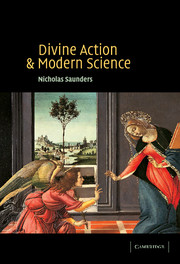Book contents
- Frontmatter
- Contents
- Preface
- Chapter 1 Motivations
- Chapter 2 Theological approaches to divine action
- Chapter 3 The laws of nature and miracles
- Chapter 4 Determinism and SDA
- Chapter 5 Divine action and quantum theory
- Chapter 6 Does God cheat at dice?
- Chapter 7 Chaos Theory and divine action
- Chapter 8 Whole–part models of SDA
- Chapter 9 Is SDA really tenable?
- References
- Index
Preface
Published online by Cambridge University Press: 02 December 2009
- Frontmatter
- Contents
- Preface
- Chapter 1 Motivations
- Chapter 2 Theological approaches to divine action
- Chapter 3 The laws of nature and miracles
- Chapter 4 Determinism and SDA
- Chapter 5 Divine action and quantum theory
- Chapter 6 Does God cheat at dice?
- Chapter 7 Chaos Theory and divine action
- Chapter 8 Whole–part models of SDA
- Chapter 9 Is SDA really tenable?
- References
- Index
Summary
The Methods of Divine Wisdom are Infinite and Unsearchable, and we must not expect fully to comprehend all the Secrets and Mysteries of God's Government, but something we may know of this, enough to teach us to reverence God, and to trust in him, and to vindicate his Providence from the Cavils of Ignorance and Infidelity; which is as much as is useful for us to know.
(Sherlock 1694, 50–1)There are of course limits to what we as human beings can say about God's activity in the world. The point was not lost on William Sherlock, a seventeenth-century Dean of St Paul's Cathedral in London, with his assertion that we could not hope to discern all of God's mysteries and secrets. We can never aspire to have a comprehensive understanding of the manner in which God acts in the world, but equally this should not push us to the opposite extreme of asserting that God's transcendent relationship with creation simply precludes any meaningful discussion of his action whatsoever. Theologians need to tread a careful middle way between claiming on the one hand that God is limited to those things human beings know and understand, and on the other that we have no relevant knowledge about divine action at all. This difficulty becomes particularly acute given the remarkable advances that the sciences have made in both explaining and predicting natural processes.
- Type
- Chapter
- Information
- Divine Action and Modern Science , pp. ix - xviiiPublisher: Cambridge University PressPrint publication year: 2002



